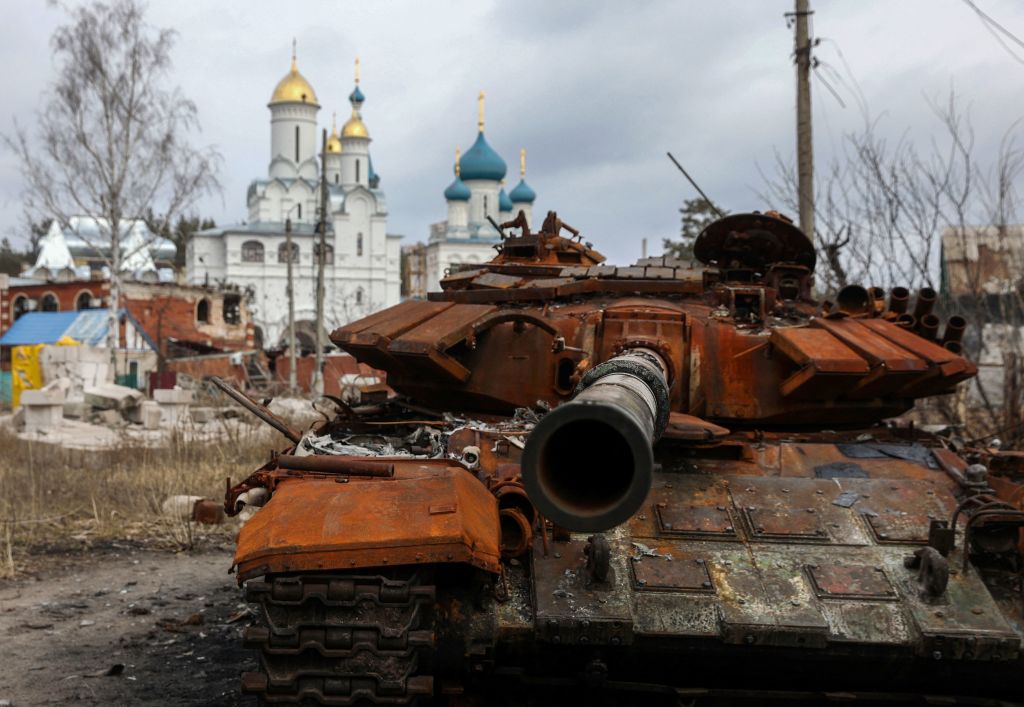The Russian disinformation machine has zeroed in on its latest target: U.S. plans to provide depleted uranium munitions to Ukraine. The Biden administration announced earlier this month that it would include the armor-piercing rounds in a $175 million aid package, and the Kremlin responding by calling Washington’s plans “a criminal act.” The only problem: Russia is already using these munitions in its invasion. But that fact does not concern Russia’s propaganda machine, which wants to scare the Biden administration and its allies into limiting assistance to Ukraine.
The density of depleted uranium makes it a very potent and effective projectile to penetrate targets, and it is significantly less radioactive than enriched uranium, leaving it unable to create a nuclear reaction. Depleted uranium ammunition could conjure up visions of nuclear-armed projectiles. But the reality is less fanciful. Edward Geist, a RAND nuclear expert, explained that depleted uranium does “retain some radioactive properties,” but the weapons “can’t generate a nuclear reaction.” The U.S. Centers for Disease Control and Prevention also notes that, “no human cancer of any type has even been seen as a result of exposure to … depleted uranium.”
Russian Foreign Minister Sergei Lavrov said in March that the U.K.’s decision to send depleted uranium ammunition to Ukraine would violate “international humanitarian law as in 1999 in Yugoslavia.” However, this is not accurate. There is no treaty directly prohibiting the use of depleted uranium munitions in an armed conflict.
Vladimir Putin’s threat that “Russia will be forced to respond accordingly,” and his claim that the depleted uranium shells are “weapons with a nuclear component” can’t be seen as credible given Russia’s own reported use of depleted uranium in Ukraine.
But Russia does not let details get in the way of a good disinformation campaign. The Kremlin’s Sputnik spread rumors this year that depleted uranium is radioactive, yields chemical toxicity, and causes cancer and kidney damage. Russia’s propaganda outlet RT warned of a “dramatic negative effect on public health and the environment,” citing studies that indicate the weapons are linked to a spike in cancer and birth defects in Iraq. A larger scientific study shows that the hundreds of tons of depleted uranium weapons used in the 1991 Gulf War could have resulted in up to 10 cancer deaths.
At the same time, Moscow accused NATO of using depleted uranium weapons in Yugoslavia during the 1999 intervention, falsely claiming the weapons caused “a spike in many diseases.” Russian Foreign Ministry spokeswoman Maria Zakharova called the U.K’s plans a repeat of the “Yugoslavia scenario,” at around the same time as the 24th anniversary of NATO’s intervention in Yugoslavia. The Russians simultaneously launched an offensive information operation in the global South using both social media and traditional propaganda outlets. Sputnik India, for example, emphasized the risks that depleted uranium shells pose to the environment, citing the supposed negative environmental and health impacts caused by the use of depleted uranium munitions by the U.S. in Kosovo and Iraq. In September Sputnik Africa emphasized how Bosnia and Herzegovina is still suffering from depleted uranium shells.
The more likely reason that Moscow is trying so hard to stop Washington and its partners from sending “harmful” depleted uranium shells is because they can be devastating to Russia’s tanks.
Accusing the United States of using “dangerous” depleted uranium ammunition is just another part of Russia’s broad disinformation campaign to accuse the West of developing and using weapons of mass destruction, including bioweapons. Russia has invented a variety of absurd accusations involving bioweapons in recent years, including claims that the U.S. intentionally spread COVID and the monkeypox, and that Washington is using alleged bioweapons labs in Ukraine to develop harmful agents. Familiar actors who spread bioweapons disinformation, like Igor Kirillov, head of Russia’s Radiation, Chemical, and Biological Protection troops, are now claiming that the U.S. is weaponizing the toxic effects of depleted uranium. Kirillov states how “the West, including the U.K. and the U.S., is well aware of the negative consequences of the use of depleted uranium munitions,” yet still “express[es] their readiness to supply this type of weapon to the Kiev regime.”
The United States has pushed back on Russian narratives on depleted uranium. Pentagon spokesman Marine Corps Lt. Col. Garron Garn said that the U.S. military “has procured, stored, and used depleted uranium rounds for several decades, since these are a longstanding element of some conventional munitions,” adding that “other countries have long possessed depleted uranium rounds as well, including Russia.”
However, these statements are not a sufficient counter to Russia’s smear campaign. Rather than allow these false accusations to circulate the globe, it is time for the U.S. to reveal the truth about Russia’s own depleted uranium and bioweapons programs.
The U.S. would do well to use information about Russia’s own experiments with bioweapons to shape an American information counteroffensive. In 1999, Kenneth Alibek, the first deputy director of the Soviet Union’s bioweapons program, told the Nonproliferation Review that “the Soviet Union was able to develop one of the most powerful and sophisticated programs in the world.” Media in the U.S. should amplify the truth about Russia’s violation of the 1972 Biological Weapons Convention and invite Alibek to talk about the Kremlin’s bioweapons program.
Given misunderstanding about the usage of depleted uranium as a weapon, the U.S. Department of Defense should emphasize that most militaries, including Russia’s, consider depleted uranium to be “a standard component” of military weapons, and should make a concerted effort to convey that Russia has its own stockpile of depleted uranium munitions.
Russia has been trying to polarize the U.S. internally and damage its reputation globally. Given that Russia uses disinformation as a weapon, the Biden administration should respond by weaponizing the truth about Russia’s depleted uranium and bioweapons program to turn the tide of Russia’s information war.








Please note that we at The Dispatch hold ourselves, our work, and our commenters to a higher standard than other places on the internet. We welcome comments that foster genuine debate or discussion—including comments critical of us or our work—but responses that include ad hominem attacks on fellow Dispatch members or are intended to stoke fear and anger may be moderated.